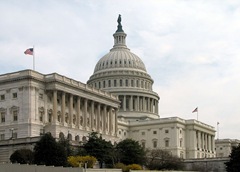As April 15 approaches, some of us experience a short-lived obsession with, and resentment of, taxes. For fairly obvious reasons, those of us who put off  sending in the old 1040 until the last minute tend to be those who need to accompany our returns with checks made out to the Treasury. Folks entitled to checks going the other way tended to file weeks ago.
sending in the old 1040 until the last minute tend to be those who need to accompany our returns with checks made out to the Treasury. Folks entitled to checks going the other way tended to file weeks ago.
Having to fill out lengthy government forms is bad enough. Capping off the process with a savingsectomy is enough to turn anybody into a grumpy Republican. For me, this is like being an Irishman on St. Patrick’s Day. I enjoy the company of my temporary compatriots, even though I know it won’t last long.
Pandering to this grumbling constituency this week was The Big Money, which shared a list of the five worst parts of the tax code. The fact that they could come up with only five tells me they are only seasonally grumpy. A year-round resident would have come up with at least ten.
Read more »
Continuing in the spirit of the tax season, this week saw at least two blogs, Weakonomics and Wallet Pop, asking if allowing taxpayers to deduct  mortgage interest is really, after all, a good idea. Both wasted little time before concluding of course not.
mortgage interest is really, after all, a good idea. Both wasted little time before concluding of course not.
In as much as this policy has any sincere defenders, the argument in favor is that it encourages home ownership. But why home ownership, of all things, is a worthwhile goal is generally left unexplored. I suppose a person might imagine some sort of Jeffersonian argument about how a nation of property owners makes for a more stable democracy. Alas, our leaders in Washington are rarely so philosophical.
When a politician says that he favors mortgage deductibility because it encourages home ownership it is a wink and/or nod in the direction of those who already own homes. It is an important bit of government largess for these voters because they get a nice tax break and, possibly more significantly, anybody they sell their house to will also get a nice tax break.
Read more »
You know those blue EnergyStar labels you sometimes see on appliances in the store? Think hard. No, not the train that gets stuck in the Channel Tunnel  when it gets cold. That’s EuroStar.
when it gets cold. That’s EuroStar.
EnergyStar is a joint program of the EPA and the US Department of Energy to help Americans “save money and protect the environment through energy efficient products and practices.” Their elaborate and cheerful website goes on to claim that
Americans, with the help of ENERGY STAR, saved enough energy in 2009 alone to avoid greenhouse gas emissions equivalent to those from 30 million cars — all while saving nearly $17 billion on their utility bills.
That’s a savings of about $150 per household last year. And you are only vaguely aware of the program? Ungrateful wretch.
Read more »
I have been giving a lot of thought to the federal budget deficit lately. Well, some thought. Not as much thought as I have been giving FiLife’s March Money Madness 16 blog tournament. I’m pretty sure they had 15 likely blogs and threw in BMA just to round out the field and add some humor.
Alas, I digress. As all us good Republicans know, the first step in closing the budget gap should be a massive reduction in government spending. I’d start with the TSA and agriculture subsidies, but that’s just me.
start with the TSA and agriculture subsidies, but that’s just me.
And we’ve got to cut out these loss-making wars. Next time we invade an oil-rich country we need to actually take the oil. Everybody else will accuse us of going to war to get the stuff anyway, so we might as well cash in.
More digression. Sorry.
A quick glance at the federal spending pie chart will tell you that the bits of the budget that can be cut in the short run are not big enough to eliminate the deficit. (For a further, but somewhat out of date, breakdown that could turn anybody into a libertarian, if not an anarchist, click here.) It breaks my heart to say it, but we need some new taxes. Here are my suggestions.
Read more »
A little more than a year ago the Obama administration announced a scheme to help mortgage borrowers in trouble, in which the loans would be modified in a way that would make the terms more affordable. I thought it was unlikely to  work as promised and said so at the time. The plan was greeted with some widespread skepticism, although a lot less than I thought was warranted.
work as promised and said so at the time. The plan was greeted with some widespread skepticism, although a lot less than I thought was warranted.
At the time, I assumed that what lukewarm enthusiasm it did garner from the media was due to a bias in favor of government intervention in general and this administration in particular. Now I am not so sure. I think it may be that the journalists charged with explaining the scheme to others did not really understand the fundamental flaws so obvious to so many of us.
The latest update on the plan’s progress in the New York Times repeats what has become a recurring theme, that the scheme is at least an order of magnitude less effective than envisioned. But read the text closely and you get the impression of true disappointment and surprise at this failure. The piece contains not a hint of discussion of why the plan failed, as if it was a unfathomable act of nature, rather than something that many thoughtful people accurately predicted from the start. And it ends with finger pointing.
The Treasury is being accused of moving the goalposts a bit. It now says its intention was merely to offer help to those four million borrowers, not to make sure they actually got it.
Read more »
 sending in the old 1040 until the last minute tend to be those who need to accompany our returns with checks made out to the Treasury. Folks entitled to checks going the other way tended to file weeks ago.
sending in the old 1040 until the last minute tend to be those who need to accompany our returns with checks made out to the Treasury. Folks entitled to checks going the other way tended to file weeks ago.


